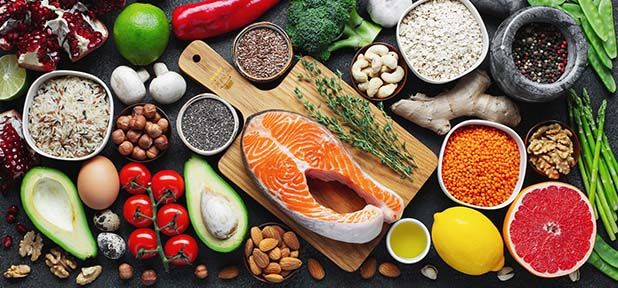This article is reviewed, corrected, and approved by: Julia Weiss CNP| RN | MPH
As women age, maintaining a balanced and nutritious diet becomes more necessary for their health and well-being. There are lots of diet options to choose from. It can be challenging for women over 50 to determine which approach is best for them.
I will try to find out how to diet as a lady and the best diets for women over 50. Including the Mediterranean diet, the DASH diet, and others. Each diet will be evaluated based on its pros and cons, key food items, and tips for adoption
My goal is to give you an accurate information from reliable sources, making it easier for them to achieve and keep a healthy lifestyle.
What Is A Balanced Diet?
A balanced diet consists of various foods to ensure you get enough nutrients, whether you take a small amount of food. A healthy diet should include diverse, nutrient-rich foods for adequate vitamin intake.
By following a balanced diet, women over 50 can improve their quality of life. Such as reducing the risk of disease and maintaining their physical and mental well-being. A nutritious diet is becoming essential for patients with chronic conditions prevention. Including heart disease and type II diabetes, osteoarthritis, and osteoporosis.
5 Meal Plans That Will Help Women Over 50 Stay Fit and Healthy
A brief overview of each of the 5 best diets for women over 50 is as follows:
Mediterranean diet
Eating fruits, vegetables, whole grains, protein, and omega-3 fatty acids is better than processed meals. Give priority to plant-based diets like olive oil for healthy unsaturated fats.
The Mediterranean diet focuses on maintaining stable blood sugar levels. It also includes anti-inflammatory meals. Avoiding processed foods can assist in managing hormone fluctuations.
DASH diet
The DASH diet prioritizes high fruit, whole grains, protein, and low-fat dairy intake. It helps to decrease blood pressure and enhance heart health.
Plant-based eating plan
Consumes a mixture of plant-based foods. Such as fruits, green leaves, beans, and nuts, while avoiding or limiting animal products. Plant-based daily calorie intake will help you to lose belly fat after 50.
A Low-carb diet
Limit your carbohydrate intake. Emphasizes protein and healthy fats from lean meat, fish, eggs, and dairy.
Low-fat diet
Intake of vegetables, fruits and vegetables, cereals, and high protein foods.
What Diseases Might Result From A Woman's Unbalanced Diet?

A lack of a balanced diet can lead to various health problems and diseases in women, including
Anaemia
Anemia refers to a condition or illness. Where the number of red blood cells (erythrocytes) or hemoglobin in less blood than usual.
Resulting in a reduced ability to carry oxygen. Also, iron, vitamin c, vitamin B9 (folate), and vitamin B2 (riboflavin) deficiency cause anemia.
Osteoporosis
Low calcium and Vitamin D levels lead to bone loss and higher osteoporosis risk.
Heart disease risk
Consuming high amounts of saturated fats, cholesterol, and salt can increase the risk of developing heart disease. People with high blood pressure may consider reduced-fat cheese as part of a balanced diet.
Type 2 diabetes
Eating a diet high in added sugars, bad fats, and processed foods raise the risk of type 2 diabetes.
Chronic disease and Certain cancers
Consuming a diet high in red and processed meats and alcohol. The intake of unhealthy fats is associated with an elevated risk of chronic disease and certain cancer.
Overweight and obesity
Those who consume a diet high in calories, excessive sugar, and unhealthy fats have a higher risk of developing weight gain and obesity.
Choosing nutrient-dense meals is essential for maintaining a healthy weight and preventing illness and obesity.
Nutrient deficiencies
A diet lacking essential vitamins, minerals, and nutrients. This can result in defects and negative health consequences.
Pros And Cons Of Each Diet
Let's check out the pros and cons of various diets for women over 50.
Mediterranean diet
A diet that can help improve brain function and reduce mental decline is the Mediterranean diet.
Pros include a focus on healthy fats, whole foods, and Plant-based diets. They may help prevent heart disease, impaired glucose tolerance, and some cancers.
Cons may include the potential for high-calorie intake due to the inclusion of healthy fats and the need to limit processed foods and red meat.
DASH diet benefits
Reduce blood pressure and improve cardiovascular health. By eating fruits, vegetables, whole grains, and low-fat dairy.
Cons may include the potential for a limited variety of foods and the need to limit salt and saturated fat.
Plant-based diet
To improve our health and well-being, choosing a plant diet with minimally processed foods can have numerous benefits. We can reduce the risk of vitamin and mineral deficiencies by emphasizing nutrient-dense foods such as iron, Zinc, omega-3 fatty acids, calcium, and vitamin B12.
One potential disadvantage of a plant-based diet is the need for careful planning to ensure adequate nutrient intake. Which can be complicated by the high-calorie content of some plant-based foods.
Low-carb diet
Pros include a focus on protein and healthy fats, which can help with losing weight and improve blood sugar control.
Cons include the need to limit certain foods that are high in carbohydrates, such as fruits, grains, and certain vegetables.
Low-fat diet
Pros include a focus on low-diet foods like salmon, tuna, blueberries, oranges, walnuts, and chia seeds. That can help with weight control (lose weight) and improve heart health.
Cons may include the potential for high-calorie intake if high-fat foods are consumed in excess and the need to limit saturated fat.
Essential Food Items To Include In Best Diets For Women Over 50

Here are some most used diet options for diets for women over 50.
Mediterranean diet
- Fruit options: berries, oranges, melons
- Veggie choices: leafy greens, bell peppers, tomatoes
- Whole grain selections: brown rice, quinoa, whole wheat bread
- Protein sources: chicken, fish, legumes.
- Healthy fat options: olive oil, avocado, nuts.
DASH diet
- Fruit options: apples, bananas, berries
- Veggies: leafy greens, carrots, tomatoes
- Whole grain options: wheat-based bread, brown rice and oatmeal
- Lean protein choices: chicken, fish, legumes
- Low-fat dairy foods options: milk, cheese, yogurt.
Plant-based diet
- Fruit choices: berries, apples, banana
- Veggie options: leafy greens, broccoli, carrots
- Whole grain selections: brown rice, quinoa, whole wheat bread
- Legume choices: lentils, chickpeas, beans
- Nut & seed options: almonds, chia seeds, flax seeds
Low-carb diet
- Meat options: chicken, beef, pork
- Fish choices: salmon, cod, haddock
- Eggs
- Dairy options: milk, cheese, yogurt
- Nuts & seeds: almonds, pecans, sunflower seeds
- Low-carb veggies: leafy greens, broccoli, cauliflower
Tips For Adopting A Healthy Eating Habit

Tips to help women over 50 adopt healthy eating habits and make the most of their chosen diet.
- Make an advance meal plan: This can be useful in avoiding unhealthy food decisions during time constraints or hunger.
- Make time for healthy meal preparation: Preparing your own meals at home. By doing so, you will be able to control the ingredients and portions and ensure that you are consuming a balanced diet.
- Have nutritious food on hand: Having healthy snacks or nutritious food can help to prevent overeating. And it will provide you with a quick and convenient source of nutrients between meals.
- Eat slowly and mindfully: Taking the time to savor each bite can help you to enjoy your food more and to avoid overeating.
- Listen to your body: It's best to pay attention to your body's hunger and fullness signals. Only consume food when you feel hungry and pause when you feel satisfied.
- Stay hydrated: Drinking water can help to keep you feeling full and support your wellbeing.
- Avoid distractions while eating: Eating while multitasking can hinder hunger and fullness awareness. For example, watching tv, using a mobile phone. They can distract you from the experience of eating and make it harder to gauge hunger and fullness.
- 5-Day Menopause Diet Plan for Weight Loss: Shed Pounds, Boost Energy, Improve health.
- Seek support: You can share goals and progress with friends and family members. Sharing these can increase your chances of achieving your goals and staying motivated.
- Intermittent fasting for women over 50: Best diet has become a popular way for women over 50 to improve their health and wellness by alternating periods of eating and fasting.
- Try to avoid GI carbs: Several typical high-glycemic indexes (GI) carbohydrates are referred to as the worst carbs after 50. Less healthy after the age of 50 foods include sugary drinks like soda and juice, candy and sweets, cake or pastries, white rice, etc.
These tips should be presented in a concise and practical manner, and the need to eat patterns, including protein foods, in your diet plans.
Nutrition For Women Over 50

Women's dietary requirements may change as they become older. Here are some important considerations for women over 50:
- Calcium and Vitamin D: As women reach menopause, their risk of osteoporosis increases. Making it essential to maintain adequate calcium and vitamin D intake. Calcium-rich foods include meat and dairy, green vegetables, and fortified diets. Sunlight exposure can provide vitamin D, and fatty fish (salmon and sardines) and fortified foods are good sources of vitamin D.
- Fiber: A high-fiber diet can help prevent constipation, which is common in older women. Here are some foods that are high in fiber. Oats, rice, pasta, brussels sprouts, artichokes, spinach, carrots, flaxseeds, pumpkin seeds, and potatoes.
- Protein: As women age, they may lose muscle mass, making it important to maintain adequate protein intake. Red meats, dairies, tofu, and beans are all good sources of high-protein.
- B vitamins: Vitamin B is vital for brain health, energy production, and cell metabolism. Good sources of vitamin B include leafy greens, poultry, and fortified foods.
- Healthy fats: Guacamole, almonds, and sunflower oil are high in nutritious fat. These potent nutrients have been shown to lower the risk of heart disease, joint pain, anxiety, dry skin, and brittle hair and nails.
Women over 50 should watch out for their nutritional needs based on some factors. Such as their health, medications, and level of physical activity. They should also focus on physical training, hydration, and limiting alcohol for better health.
Conclusion
There are enough diet choices available out there. It's hard to find one that fits individual needs, preferences, and lifestyles. Whether it's the Mediterranean keto diet, Dash diet, or another approach. The key is to focus on consuming various nutrient-rich foods. Moderating portions and staying consistent with the diet plan.
Women above or below 50 years or lower/above can also try all the guidelines. It's always the best idea to consult a doctor or dietitian before creating a personalized plan. By following these strategies, women over 50 can achieve optimal health by adopting healthy eating habits.
F.A.Qs
Q: What is food cravings meaning chart?
Ans: A food cravings chart is a tool that categorizes food cravings based on their possible underlying causes. A cravings chart may also list healthier alternatives to unhealthy foods. Commonly craved, instead of sugary treats, you could eat a piece of fruit or a handful of nuts.
Q: Which diet is best for women over 50?
Ans: This question is quite difficult to answer. Certain diets may be effective for some people while others are not. You might seek the help of a dietician to speed up the process of determining the proper diet.
Balanced Diet for Women Over 50
- A balanced diet ensures sufficient nutrient intake, even with smaller portions.
- It reduces the risk of chronic conditions like heart disease, diabetes, and osteoporosis.
5 Best Diets for Women Over 50
- Mediterranean Diet
- Focus on whole foods, plant-based diets, and healthy unsaturated fats.
- Supports stable blood sugar levels and includes anti-inflammatory meals.
- DASH Diet
- Emphasizes fruits, whole grains, low-fat dairy, and protein for improved heart health and blood pressure.
- Plant-Based Eating Plan
- Emphasizes plant-based foods, minimizing animal products for a nutrient-rich diet.
- Helps in weight management and reducing belly fat.
- Low-Carb Diet
- Limits carbohydrate intake, emphasizes protein and healthy fats for weight control and blood sugar improvement.
- Low-Fat Diet
- Focuses on lean proteins, fruits, vegetables, and low-fat dairy for weight control and heart health.


